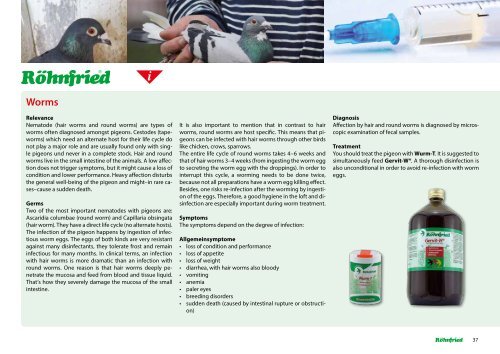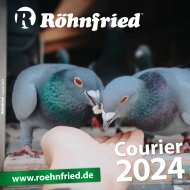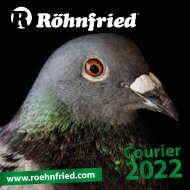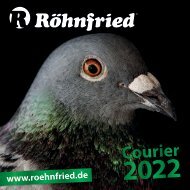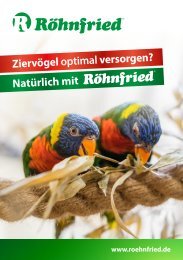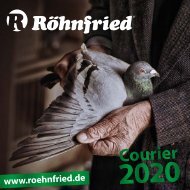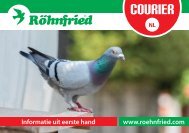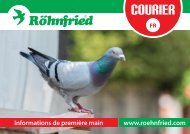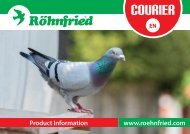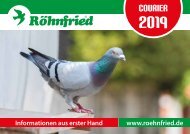Röhnfried Courier 2018 English
Product catalog and information about racing pigeons, breeders and lofts
Product catalog and information about racing pigeons, breeders and lofts
Create successful ePaper yourself
Turn your PDF publications into a flip-book with our unique Google optimized e-Paper software.
Worms<br />
Relevance<br />
Nematode (hair worms and round worms) are types of<br />
worms often diagnosed amongst pigeons. Cestodes (tapeworms)<br />
which need an alternate host for their life cycle do<br />
not play a major role and are usually found only with single<br />
pigeons und never in a complete stock. Hair and round<br />
worms live in the small intestine of the animals. A low affection<br />
does not trigger symptoms, but it might cause a loss of<br />
condition and lower performance. Heavy affection disturbs<br />
the general well-being of the pigeon and might–in rare cases–cause<br />
a sudden death.<br />
Germs<br />
Two of the most important nematodes with pigeons are:<br />
Ascaridia columbae (round worm) and Capillaria obsingata<br />
(hair worm). They have a direct life cycle (no alternate hosts).<br />
The infection of the pigeon happens by ingestion of infectious<br />
worm eggs. The eggs of both kinds are very resistant<br />
against many disinfectants, they tolerate frost and remain<br />
infectious for many months. In clinical terms, an infection<br />
with hair worms is more dramatic than an infection with<br />
round worms. One reason is that hair worms deeply penetrate<br />
the mucosa and feed from blood and tissue liquid.<br />
That’s how they severely damage the mucosa of the small<br />
intestine.<br />
It is also important to mention that in contrast to hair<br />
worms, round worms are host specific. This means that pigeons<br />
can be infected with hair worms through other birds<br />
like chicken, crows, sparrows.<br />
The entire life cycle of round worms takes 4–6 weeks and<br />
that of hair worms 3–4 weeks (from ingesting the worm egg<br />
to secreting the worm egg with the droppings). In order to<br />
interrupt this cycle, a worming needs to be done twice,<br />
because not all preparations have a worm egg killing effect.<br />
Besides, one risks re-infection after the worming by ingestion<br />
of the eggs. Therefore, a good hygiene in the loft and disinfection<br />
are especially important during worm treatment.<br />
Symptoms<br />
The symptoms depend on the degree of infection:<br />
Allgemeinsymptome<br />
• loss of condition and performance<br />
• loss of appetite<br />
• loss of weight<br />
• diarrhea, with hair worms also bloody<br />
• vomiting<br />
• anemia<br />
• paler eyes<br />
• breeding disorders<br />
• sudden death (caused by intestinal rupture or obstruction)<br />
Diagnosis<br />
Affection by hair and round worms is diagnosed by microscopic<br />
examination of fecal samples.<br />
Treatment<br />
You should treat the pigeon with Wurm-T. It is suggested to<br />
simultaneously feed Gervit-W®. A thorough disinfection is<br />
also unconditional in order to avoid re-infection with worm<br />
eggs.<br />
37


